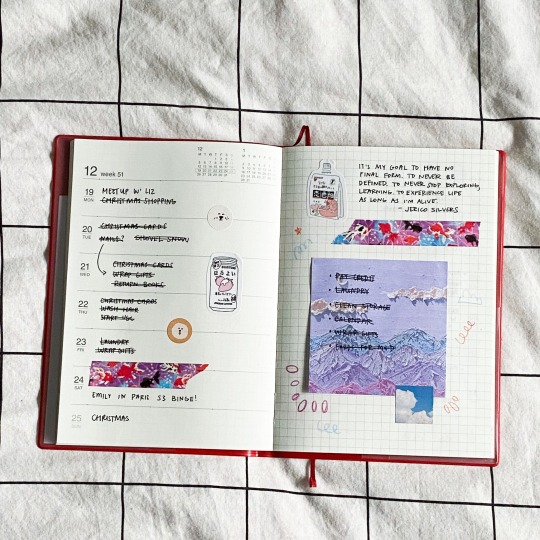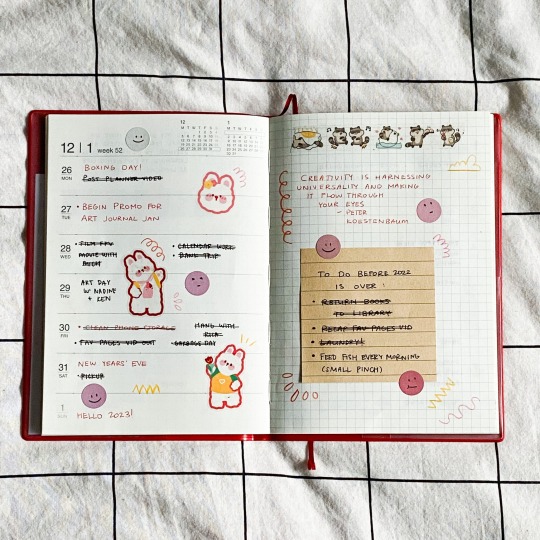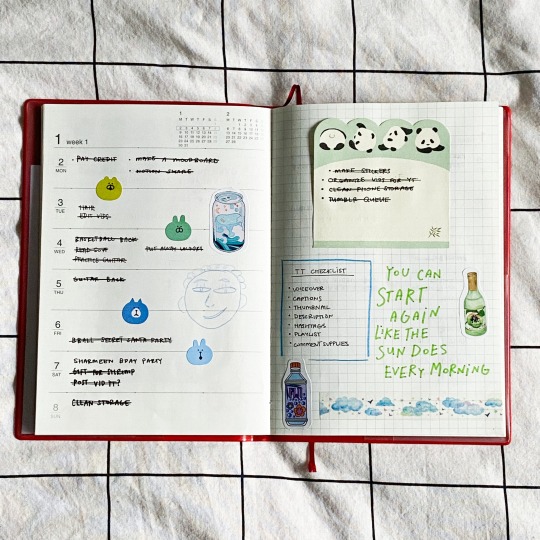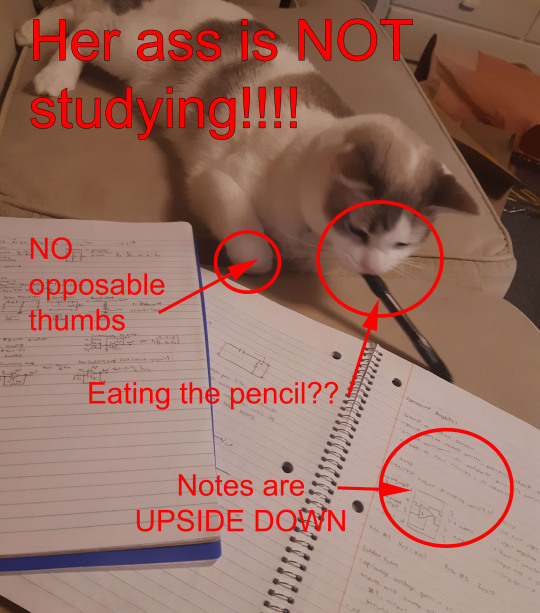hi, i'm elodie! 22, college senior, ADHD as hell lover of books and cats 🌙 theater, asian studies, and japanese major [this blog is pretty inactive, but I still check tumblr frequently and use this for study resources] icon: lahnister
Don't wanna be here? Send us removal request.
Text
I've had a hard time articulating to people just how fundamental spinning used to be in people's lives, and how eerie it is that it's vanished so entirely. It occurred to me today that it's a bit like if in the future all food was made by machine, and people forgot what farming and cooking were. Not just that they forgot how to do it; they had never heard of it.
When they use phrases like "spinning yarns" for telling stories or "heckling a performer" without understanding where they come from, I imagine a scene in the future where someone uses the phrase "stir the pot" to mean "cause a disagreement" and I say, did you know a pot used to be a container for heating food, and stirring was a way of combining different components of food together? "Wow, you're full of weird facts! How do you even know that?"
When I say I spin and people say "What, like you do exercise bikes? Is that a kind of dancing? What's drafting? What's a hackle?" it's like if I started talking about my cooking hobby and my friend asked "What's salt? Also, what's cooking?" Well, you see, there are a lot of stages to food preparation, starting with planting crops, and cooking is one of the later stages. Salt is a chemical used in cooking which mostly alters the flavor of the food but can also be used for other things, like drawing out moisture...
"Wow, that sounds so complicated. You must have done a lot of research. You're so good at cooking!" I'm really not. In the past, children started learning about cooking as early as age five ("Isn't that child labor?"), and many people cooked every day their whole lives ("Man, people worked so hard back then."). And that's just an average person, not to mention people called "chefs" who did it professionally. I go to the historic preservation center to use their stove once or twice a week, and I started learning a couple years ago. So what I know is less sophisticated than what some children could do back in the day.
"Can you make me a snickers bar?" No, that would be pretty hard. I just make sandwiches mostly. Sometimes I do scrambled eggs. "Oh, I would've thought a snickers bar would be way more basic than eggs. They seem so simple!"
Haven't you ever wondered where food comes from? I ask them. When you were a kid, did you ever pick apart the different colored bits in your food and wonder what it was made of? "No, I never really thought about it." Did you know rice balls are called that because they're made from part of a plant called rice? "Oh haha, that's so weird. I thought 'rice' was just an adjective for anything that was soft and white."
People always ask me why I took up spinning. Isn't it weird that there are things we take so much for granted that we don't even notice when they're gone? Isn't it strange that something which has been part of humanity all across the planet since the Neanderthals is being forgotten in our generation? Isn't it funny that when knowledge dies, it leaves behind a ghost, just like a person? Don't you want to commune with it?
39K notes
·
View notes
Text
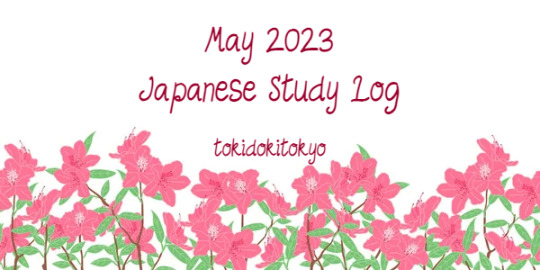
2023年5月31日
TL;DR: Don't feel inadequate if your language learning journey is not the same as that of others. Your path is valid and you are doing great!
May seemed to just speed on by! And now it's time for my monthly Japanese study log. I think this month I felt a lot of shame for not having time to do the big goals that I have set for myself, and seeing people on langblr or studyblr accomplishing a lot of big goals makes me feel inadequate. It's important to remember that your language journey is your own, not someone else's, and there is no shame in going at your own pace. I try to focus on the things that I accomplish and not make the journeys that other people are on into some kind of impossible standard to hold myself to. Look at your own learning through the lens of how far you have come, and you will feel less like you are lacking.
つまり、自分なりに言語の勉強を続いてね。周りの人の道は自分とは違っても、自分でも成長していますね。これからも続きましょう!
5月はあっという間に終了です!今からは日本語の勉強日記を書こうと思います。今月は大きいな目標をなかなか進まなくて辛かったです。それに、タンブラーやインスタグラムの勉強垢をよく見てて、なんか自分が足りないって感じていました。日本語や言語の勉強は自分のやり方で自分のペースで進んだ方がいいと覚えた方がいいと思いますから、それを頑張って思い出そうとしています。他人の成長を見ながら自分の成長が足りないなと思うことはよくやりますが、それを辞めるように努力します。一か月や一年前の自分を見たら、今まですごく成長してきたと気づいたら、足りなくないとわかるかもしれません。
My 2023 Goals Progress
I laid out some broad goals for my Japanese study in my 2023 Japanese Language Goals post, so, as always, I start off my update with my progress towards these goals.
1. Read one page a day of 日本の歴史366 (にほんのれきし366) everyday in 2023.
How is it going? Good! I am finally getting back on track after setbacks from late work nights, illness, and vacation time. Since this is a page-a-day study book, I would have preferred to keep reading in order and to catch up on the days I missed reading, but that was physically impossible due to a lack of time in general. So I am continuing on even though I skipped some days because it's good reading practice and I still learn vocabulary and kanji daily.
2. Finish 日本語総まとめ N3 (にほんごそうまとめ N3) workbooks.
How is it going? Good! I have been doing one workbook daily entry per day for at least 2 days a week. There are 4 workbooks (Vocabulary, Kanji, Grammar, Listening) with 6 weeks and 6-7 daily entries per week. I am still on Week 5 out of 6 weeks, but I am progressing much more than I did last year (or the year before that lol).
I take my time with each lesson, reviewing the vocab/kanji/grammar points meticulously, so that I absorb the information rather than just rush through it. Sometimes I already know most of the vocab or kanji or grammar, but other days require more focus. I feel like I am retaining more information by doing it little-by-little, rather than just trying to get as much done as possible in one sitting. In May, I didn't review the lessons afterwards and throughout the week, so I might take some extra time to do that once I finish the series.
3. Review and learn the first 6 levels of the 常用漢字 (じょうようかんじ), specifically the 教育漢字 (きょういくかんじ) up to grade 6.
How is it going? Okay. I have been trying to focus on Joyo Kanji in my kanji reviews, so I went back to Grade 1 kanji to start my review. It helps me to figure out which ones I know well and where I am struggling. Goal: Review through at least grade 3 during the month of June.
4. Read at least one book every two months.
How is it going? Not great. I haven't had the time (nor the motivation) to pick back up the books I stopped in March, and I'm trying to be okay with that ^^; I would like to pick back up one book in June and try to finish it by July. One thing that I am continuing to read is the Gekkan Shojo Nozaki-kun manga series (in small chunks, usually before bed).
5. Improve my speaking and writing by finding a tutor.
How is it going? It could be better. I am going to set a deadline for finally finding a tutor. I just worry that if I find a tutor I won't be able to commit to a regular schedule and I'll just drop off like I have before. I keep thinking if I had more time to search for a tutor it'd be more permanent, but I think I am just procrastinating (shocked gasps from all). There's also a small worry about the financial commitment, but I am going to try to be frugal in other areas to allow for this luxury. Goal: I will find a tutor by June 30th (or at least start making regular appointments with tutors).
I've also added on to this goal that I would like to start writing sentences on HelloTalk so that I can get feedback without needing a tutor. This might help me to get motivated to improve instead of being terrified of making mistakes. Goal: Write one sentence a day on HelloTalk in June.
6. Study Japanese for at least 10 minutes every day.
How is it going? Good! Thank goodness I have been studying Japanese every day for so long that it's not even something I have to think about trying to fit into my schedule anymore.
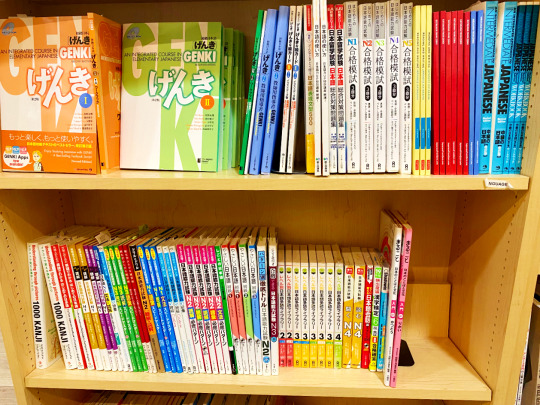
May Study Log
This month my top study areas were Vocabulary, Kanji, and Speaking. I spent the least time studying Grammar and practicing Writing.
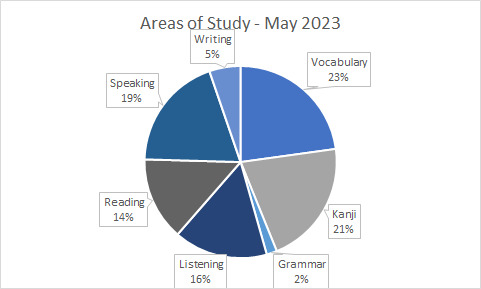
Study Methods I Used in May
Social Media
Not only did I use apps like renshuu.org (flash cards) and Easy Japanese (articles in Japanese) to study in May, I also used Instagram and started back up on HelloTalk. The idea is to interact with social media in a meaningful way by reading and writing in Japanese. I commented on other user's posts and reached out to some of them as well to start a conversation. The only drawback to this method is that you can get lost in endless doom scrolling if you don't focus on what you are there for (i.e. interaction) and just get lost in the algorithm.
Conversation
I speak Japanese daily (with my husband and son) and since my son is starting to speak in 3-4 word sentences and to copy our speech patterns, I am more mindful of what I am saying to him and how I am saying it (for example, using 大変 instead of やばい ^^;). However, when speaking with my husband it is easier to fall into a Japanglish routine with him, to drop formality and be lazy with sentence construction, and to speak in a more masculine way (because I tend to mimic the speech patterns of those I am speaking with). I have recently made a few Japanese mom friends with whom I can practice Japanese conversation. So I try to utilize our play dates by speaking both formal and casual Japanese, being mindful of my interactions, and trying to utilize new words or grammar points. Using Japanese is the best way to improve it, after all. The only drawback is that the conversation practices can be spaced few and far between, so spending time mindfully speaking at home is also important.
Reading
I have been doing far less reading than I was at the beginning of the year, but I still try to read something for just a few minutes a day to practice reading. Either an article, manga, or even just social media, just to keep myself practicing. Like conversation practice, the best way to improve my reading skills is to keep reading. The drawback is that if I try to read a book but then I have to put it down for a while, I forget what was happening or I lose my motivation to keep reading it because I feel like I am not making progress. If reading books is just not feasible due to a time crunch, I find it much better to read something shorter (articles or part of a manga), and I try not to be hard on myself for not reading a whole book when it seems like everyone else is reading tons of books every month.
Going Forward in June
Be continuous with 日本の歴史366
Focus on grades 1-3 of 教育漢字
Start regular italki tutor sessions
Write in Japanese on HelloTalk
Read one of the books I started earlier in the year by the end of July
I've been studying Japanese for a long time and I still feel inadequate a lot of the time. If you have studied Japanese for any amount of time, please be proud of yourself. You've done something that a lot of people only wish they could do. As always, I wish you much success in your language endeavors, and I hope we can continue on this journey together (no matter where our paths take us)!
長い間日本語を勉強しててもまだまだ足りないと思てます。今までちょっとでも長い間でも日本語を勉強している人に伝いたいことは、よく頑張ったね!日本語を勉強したくても勉強したことない人もたくさんいますので、勉強している人はすごいと思います。そして、自分なりにつづいてください。これからも、皆さん勉強の成功と成長を願っています。どんな道でも、一緒に勉強を続きましょう!
51 notes
·
View notes
Text
cooking while chronically ill
baking with arthritis or other chronic hand pain
living with chronic migraines
adhd meal plan
chronic pain tips
getting yourself to eat
84K notes
·
View notes
Text

// how i use notion for uni by @peachblossomstudy
i’ve been in lectures for 9 weeks now (eek!) and have pretty much entirely transitioned to planning using notion, so i thought i’d do a little overview of my current system. this will probably change at some point but at the moment it works very well for me.
uni hub
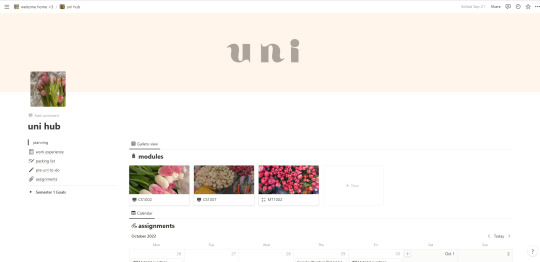
the uni hub is where the magic happens! my uni hub is where i keep track of everything school related. i have a gallery database with pages for each of my current modules, and underneath that a calendar view of all my assignments (more on those in a bit). i also have a sidebar with some important pages: my work experience tracker, my assignments tracker, and my packing list.

the modules database holds a page for each of my modules - on my hub page this is filtered by semester, so only shows my semester one modules at the moment. each module page is where i take my notes, keep my tutorial questions and write down any important module information.
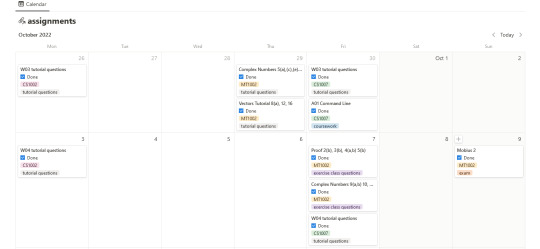
under the modules database is a calendar view of my assignments database, which is pretty self-explanatory and a good way of visualising how much time i have until each assignment is due.
module pages

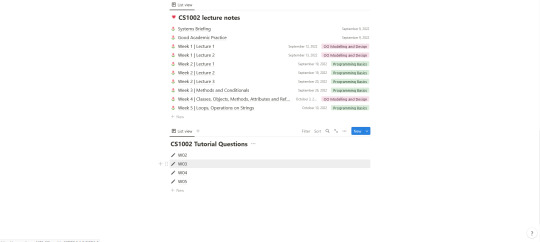
each of the individual module pages are where all information related to that module goes. they start with toggle to hold important information without cluttering up the page, and then have a view of my assignments database filtered for that particular module. i use lists to store my lecture notes and tutorial questions.
assignments database
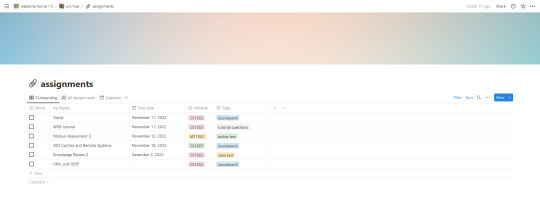
one of my most important tools is my assignments database - this is where i keep track of all my assignments, both previous and still to do. the database contains the due date, module and type of assignment, with a checkbox to mark when the assignment has been completed.
planner
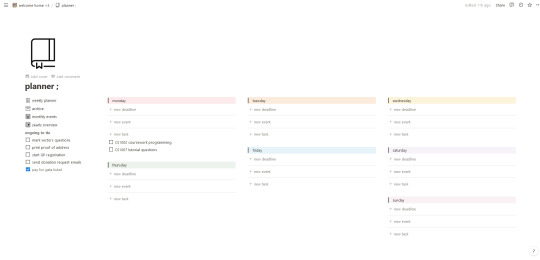
finally, there’s my weekly planner! this is where i keep track of all my daily tasks, ongoing tasks, deadlines and events. i’ve found that having a digital weekly planner is much more convenient for uni than a physical planner - setting it up requires much less of my time, and it’s always with me.
that’s all for this post! thank you for reading this far. and i hope this was helpful <3
556 notes
·
View notes
Text
so metropolitan museum of art has a register of books they’ve published that are out of print and that you can download for free! they’re mostly books on art, archeology, architecture, fashion and history and i just think that’s super useful and interesting so i wanted to share! you can find all of the books available here!
182K notes
·
View notes
Text
of all the advice i’ve seen for reading more books… the different advice videos and blog posts i’ve seen haven’t really addressed the thing i personally have found is pivotal in reading more demanding books. which is. to humble yourself. not in a religious way but in a way where it’s like you have to bear the discomfort of feeling stupid and like you’re progressing slowly at the text and carry on nonetheless. and just feel discomfort willingly. it’s like a text can sense when you don’t want to sacrifice anything to it and will withhold itself from you till you show loyalty… after you prove your willingness to feel discomfort— that’s the moment the discomfort stops and you get immersed and swept away and it becomes easier to read. this is of course not scientific but seeing it this way is useful for me
3K notes
·
View notes
Text
had a minor crisis when 12ft.io went down yesterday and thankfully it's back now but this seems like a good opportunity to compile a list of similar paywall-evading tools in case 12ft ever gets canned for real:
12ft.io: the legend himself. definitely my favorite of the bunch by virtue of being the easiest to use (and the easiest url to remember), but it's configured to disable paywall evasion for a handful of popular sites like the new york times, so you'll have to go elsewhere for those.
printfriendly: works great; never had any issues with removing paywalls, even on domains that don't work with 12ft.io. since this site is literally designed to make sites print-friendly, it might simplify the overall formatting of the page you're trying to access, which can be a good or bad thing. my only real issue is that the "element zapper" (which lets you remove content blocks from the print-friendly preview) is a little sensitive if you're browsing on a touchscreen device, which means you might accidentally delete a paragraph when you're just trying to scroll. but if that happens you can reload the page and it'll revert everything back to its original state.
fifteen feet: basically a 12ft clone, minus 12ft's restrictions. haven't used it much since I only discovered it yesterday in the wake of 12ft's 451 error but it seems to do the trick.
archive.today: an archival tool very similar to the wayback machine, but it also works as a de facto paywall removal tool. (the wayback machine seems to remove paywalls as well, but archive.today has better UX imo and is way faster to use.)
and an honorable mention for sci-hub: only works for scientific/academic journals, not random news articles, but the other sites listed above only work for random news articles and not academic publications so you gotta have this one in your toolbelt for full coverage. pubmed is your oyster.
52K notes
·
View notes
Text
An incomplete list of things that employers commonly threaten that are 100% illegal in the United States
"We'll fire you if you tell others how much you're making" The National Labor Relations Act of 1935 specifically protects employees who discuss their own wages with each other (you can't reveal someone else's wages if you were given that information in the course of work, but you can always discuss your own or any that were revealed to you outside of work duties)
"If we can't fire you for [discussing wages/seeking reasonable accommodation/filing a discrimination complaint/etc], we'll just fire you for something else the next day." This is called pretextual termination, and it offers your employer almost no protection; if you are terminated shortly after taking a protected action such as wage discussion, complaints to regulatory agencies, or seeking a reasonable accommodation, you can force the burden onto your employer to prove that the termination wasn't retaliatory.
"Disparaging the company on social media is grounds for termination" Your right to discuss workplace conditions, compensation, and collective action carries over to online spaces, even public ones. If your employer says you aren't allowed to disparage the company online or discuss it at all, their social media policy is illegal. However, they can forbid releasing information that they're obligated to keep confidential such as personnel records, business plans, and customer information, so exercise care.
"If you unionize, we'll just shut this branch down and lay everyone off" Threatening to take action against a group that unionizes is illegal, full stop. If a company were to actually shut down a branch for unionizing, they would be fined very heavily by the NLRB and be opening themselves up to a class-action lawsuit by the former employees.
"We can have any rule we want, it's only illegal if we actually enforce it" Any workplace policy or rule that has a "chilling effect" on employees' willingness to exercise their rights is illegal, even if the employer never follows through on any of their threats.
"If you [protected action], we'll make sure you never work in this industry/city/etc again." Blacklisting of any kind is illegal in half the states in the US, and deliberately sabotaging someone's job search in retaliation for a protected action is illegal everywhere in the US.
"Step out of line and you can kiss your retirement fund/last paycheck goodbye." Your employer can never refuse to give you your paycheck, even if you've been fired. Nor can they keep money that you invested in a retirement savings account, and they can only claw back the money they invested in the retirement account under very specific circumstances.
"We'll deny that you ever worked here" not actually possible unless they haven't been paying their share of employment taxes or forwarding your withheld tax to the government (in which case they're guilty of far more serious crimes, and you might stand to gain something by turning them in to the IRS.) The records of your employment exist in state and federal tax data, and short of a heist that would put Oceans 11 to shame, there's nothing they can do about that.
102K notes
·
View notes
Text
spotify is selling audiobooks now…..once again tapping the sign:
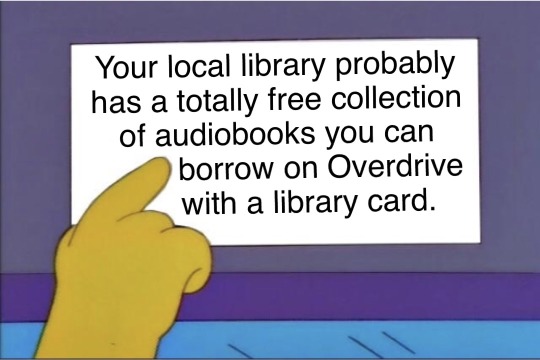
dont give them your money when you could be supporting your local library!
74K notes
·
View notes
Photo

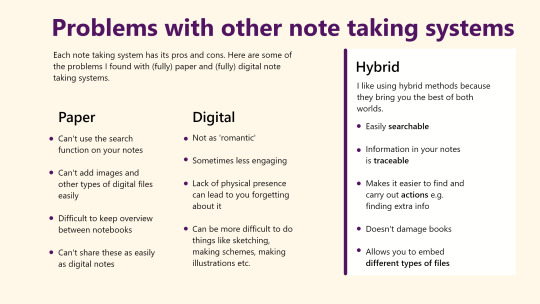
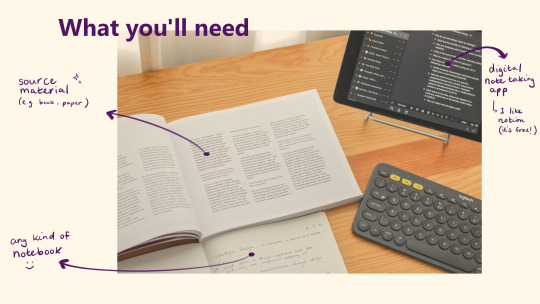
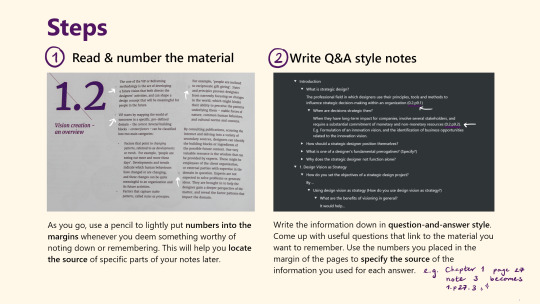
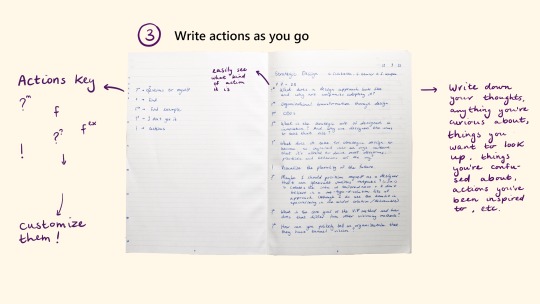
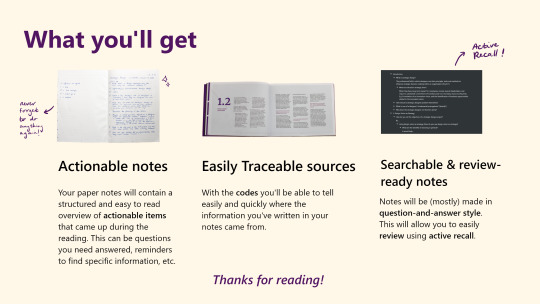
Hybrid Note Taking Style
A note taking method that blends the best of paper and digital note taking that I’ve been exploring lately. So far it’s working really well for me :) Hope it helps!
Hybrid Note Taking Method
Problems with other note taking systems
Each note taking system has its pros and cons. Here are some of the problems I found with (fully) paper and (fully) digital note taking systems.
Paper
Can’t use the search function on your notes.
Can’t add images and other types of digital files easily.
Difficult to keep overview between notebooks.
Can’t share these as easily as digital notes.
Digital
Not as ‘romantic’.
Sometimes less engaging.
Lack of physical presence can lead to you forgetting about it.
Can be more difficult to do things like sketching, making schemes, making illustrations etc.
Benefits of Hybrid
I like using hybrid methods because they bring you the best of both worlds.
Easily searchable.
Information in your notes is traceable.
Makes it easier to find and carry out actions e.g. finding extra info.
Doesn’t damage books.
Allows you to embed different types of files.
What you’ll need
Source material (e.g. book, academic paper)
Any kind of notebook :)
Digital note-taking app → I like Notion (it’s free).
Step 1 - Read & number the material
As you go, use a pencil to lightly put numbers into the margins whenever you deem something worthy of noting down or remembering. This will help you locate the source of specific parts of your notes later.
Step 2 - Write Q&A-style notes
Write the information down in question-and-answer style. Come up with useful questions that link to the material you want to remember (e.g. Q → What is the main problem with using platform-based planning for new ventures? A → Assumptions underlying the plan are used as fact rather than best-guess estimates to be tested and questioned). Use the numbers you placed in the margin of the pages to specify the source of the information you used for each answer.
Example → Chapter 1 page 27 note 3 becomes 1.p27.3
Step 3 - Write actions as you go (Supporting notes)
Supporting notes
Write down your thoughts, anything you’re curious about, things you want to look up, things you’re confused about, actions you’ve been inspired to do, etc. For example → ?m Maybe I can apply this to my visualization assignment? / ! Look up what 'plurality of the future’ is / fex Organizational transformation through design. I find this a great way to support and manage the learning process.
Action key
Keep a small action key in which you have an overview of what your action marks mean (e.g. ?m→ questions to myself, f → find, fex → find example, ?? → I don’t get it, ! → general actions)
Don’t be afraid to customize your actions!
What you’ll get
Actionable notes
Your paper notes will contain a structured and easy to read overview of actionable items that came up during the reading. This can be questions you need answered, reminders to find specific information, etc. This will make them a lot harder to forget to do!
Easily traceable sources
With the codes you’ll be able to tell easily and quickly where the information you’ve written in your notes came from.
Searchable & review-ready notes
Notes will be (mostly) made in question-and-answer style. This will allow you to easily review using active recall. All you need to do is cover/hide the answer and you can check how well you truly know the material.
Thanks for reading!
5K notes
·
View notes
Text
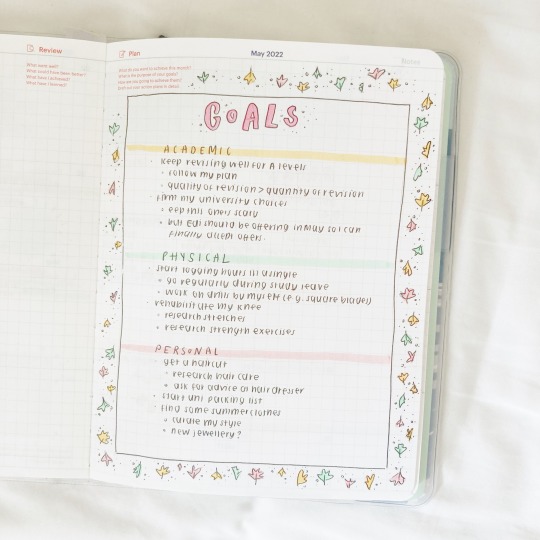
// may 2022
yes this is half way through the month but at least it’s the right month! my may theme is inspired by the leaf doodles in heartstopper, which i watched soon after it came out. i thought it was really cute and definitely a story that needs to be told but probably aimed at a slightly younger age group. i did really love the doodles which is why i chose to recreate them in my planner!
538 notes
·
View notes
